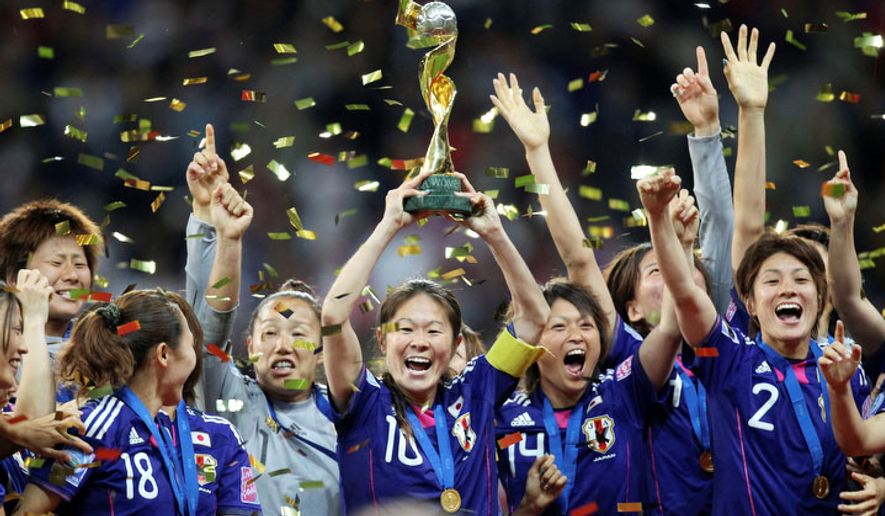TOKYO — Like flags in a soccer stadium, the banners are everywhere across Japan’s tsunami disaster zone.
They often bear a single Japanese word — “ganbare,” which Japanese have been murmuring like a mantra ever since the March 11 disasters.
Interpreters and bilingual Japanese say that “ganbare” is one of the hardest words to translate: “Persevere,” “fight on” and “hang in there” don’t quite capture its deep significance.
But Japan’s women’s soccer team does.
Too small, too old, too inexperienced — the unheralded Japanese women have overcome huge obstacles at the World Cup in Germany and have won their way into the hearts of Japanese. Across the disaster zone, survivors huddle around TV sets watching replays of matches that have been played in the middle of the night Japan time.
Japan beat host nation Germany in the quarterfinals and Sweden in the semifinals en route to a final match with a heavily favored U.S. team that has beaten Japan 26 times in a row.
Sunday, the team rallied twice from one-goal deficits and beat the Americans in penalty kicks for the country’s first World Cup title.
“They’re not just playing a soccer game. They’re playing to heal a wounded country,” said Tony DiCicco, coach of 1999 World Cup-winning U.S. women’s team, according to the Associated Press. “They have won fans not just in Japan and not just here in Germany, but all over the world.”
Growing up in a male-dominated culture, where women traditionally were expected to serve tea in offices and quit jobs to become housewives, the Japanese players had to fight just to find space on school playgrounds among boys wanting to play baseball and soccer without them.
Japanese girls still usually are seen playing tennis or volleyball after school, while boys pursue dreams of playing Major League Baseball or World Cup soccer.
The women’s soccer team is known in Japan as “Nadeshiko” — a reference to a frilled pink carnation but also a nostalgic phrase dating back at least to World War II that describes the “ideal” loyal and resilient Japanese woman.
Though they reached the Final Four at the Beijing Summer Olympics in 2008, the women’s soccer team only now has made the front pages here amid the nuclear crisis.
Japanese TV networks, which saturated viewers with hours of coverage hyping the male heroes at the 2010 World Cup in South Africa, weren’t prepared for the rise of women’s soccer and are scrambling to figure out how Japan has risen so quickly in the sport.
Even sports bars, which are packed with boisterous fans for men’s national-team games, are only starting to see larger groups of fans cheering for the women.
A Japan victory could see crowds gathering at the famous “scramble crossing” in the Shibuya entertainment district, where thousands squeezed in to holler and blow vuvuzela horns after men’s Word Cup games in 2010.
Yet Japan is not lacking in heroic female athletes, especially in tennis, golf, running and snowboarding. A curling team of “ordinary office ladies” from northern Japan inspired people here with their victories at the 2006 Winter Games in Turin, Italy.
Many soccer players now are joining the pantheon of local heroes.
Aya Sameshima used to work part time at the Fukushima nuclear plant and was in southern Japan when the tsunami devastated the power plant on the northeast coast.
Her teammate Karina Maruyama, who came off the bench to score the game winner against Germany, dedicated the goal to disaster victims. Until a year ago, she had played for a team owned by the Tokyo Electric Power Co. (Tepco), operator of the damaged Fukushima plant.
Ms. Maruyama, whose friends have been risking their health to contain radiation spewing out of reactors, said she was hurt by widespread public criticism of Tepco, according to the Asahi newspaper. The Fukushima nuclear crisis “was caused by a natural disaster,” she wrote in her blog. “So why is TEPCO being so criticized?
She said she cried before the game, when Japanese coach Norio Sasaki showed the players footage of disaster victims. “I couldn’t help but tear up. All we can do is play our best for the people watching TV.”
Mr. Sasaki said he told the players: “Our play can give power to the disaster survivors. When you’re struggling, think of the survivors, and ’ganbare.’”




Please read our comment policy before commenting.